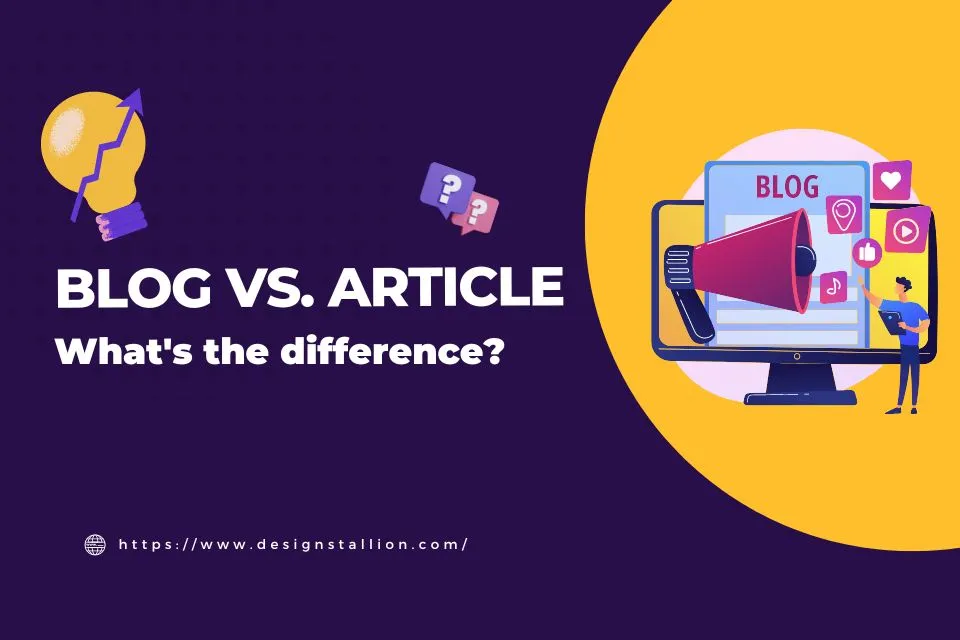Contents
- What Makes A Blog Post Different From An Article?
- What Is A Blog?
- What Is An Article?
- Blog vs. Article – Audiences Demanding New Content Experiences
- Blog Posts And Articles Have Different Styles
- 5 Main Differences Between Blogs And Articles
- How to Write a Blog?
- 2. The tone of writing
- How to Write an Article?
What Makes A Blog Post Different From An Article?
- The way blog posts and articles are written and presented to readers is another significant distinction between the two types of content.
- Blogs and articles are based on different writing skills, and one can easily differentiate with their tone.
- Articles are typically significantly longer than blog posts, typically between 300 and 1200 words.
- An article would discuss a topic in greater detail. But a blog post is a shortened description of an issue or the author’s viewpoint.
- The writing will have a different tone. Articles are typically written in a formal and professional journalistic style by article writers who are paid for their work, whereas blog postings generally are more casual and conversational.
- Articles will undoubtedly be edited before publication to ensure that the cited sources are accurate and that the spelling and punctuation are correct. On the other hand, blog postings are exposed to much less scrutiny, mainly because they are based on opinions and may be easily edited and changed if a reader identifies an issue.
- Except for intellectual and technical groups, articles are rarely read. Only professionals can analyze them if the author has done their work correctly and the research and logic are solid. Blogs are designed to be shared and discussed. Readers are frequently encouraged to offer questions and comments because of their brief, concise, and subjective nature.
What Is A Blog?
Write and publish to other websites with an approach to a journal for your business!
Before getting confused with the difference between a blog vs. article, get to know more about blogs. The answer to this question can be found in the word’s etymology. It turns out that the word “blog” is a portmanteau created by combining the words “web” and “log.” This is an effective way of viewing your blog: as a form of log or journal for your company. Without overwhelming readers with technical details, it is a human statement composed of anecdotes and updates that let readers connect with your company. In a single word, a blog is storytelling or even casual writing since it enables a company to convey its story in a relevant way.
What Is An Article?
You might mix up the writing styles of blog vs. article. But they both are a different ball game altogether.
The writing style used for articles is exceptionally formal and is based on professional writing. Articles typically have more than 300 words and occasionally even 1000 words. It is fact-based and is based on an interview, research, reasoning, analysis, or report. It is built on a formal and academic tone. It is verified by the editor or reviewer team. Articles are formal, professional, and discursive.
Blog vs. Article – Audiences Demanding New Content Experiences
Get to know all the top trends in content marketing to stay ahead of the innovation:
Better Experience
Customers require a better experience with increasing detail of what data they are giving up and how long.
Purpose-driven content
Consumers want brands to take meaningful action. Brands can use content and communications to drive material change on behalf of their audience.
Quality content bringing results
Clients target their content creation and budgets to make it super effective. Creating a high quantity of good quality content brings in some good results.
Content monetization
Content monetization will continue to grow for businesses.
The first is selling content directly to customers for a one-time fee or subscription. The second is advertising and brand partnerships surrounding the content itself.
Blog Posts And Articles Have Different Styles
Blog articles typically allow readers to submit comments. They facilitate dialogue with your readership. You can reply to reader comments and engage them in dialogue. On the other hand, there are few areas for discussion in articles because the author often states the facts of the narrative or topic. Blog posts differ from articles because they are built around SEO keywords and have a casual writing style.
Web content writing service helps businesses and agencies take their content to the next level and engage customers. It can make your website content stand out from the crowd. You can get great ideas and inspiration, expert guidance, and assistance with writing. We know how important your website is to your company’s success, and we are confident we can deliver a website that will bring in new customers.
5 Main Differences Between Blogs And Articles
Understand the differences between blogs and articles if you write content or purchase articles. Here are the main differences between blogs and articles.

How to Write a Blog?
1. A different narrative structure
There is another point of view in the narrative structure.
Blog postings are only published online. Focus more on sharing your viewpoint, and have a less official, casual tone.
2. The tone of writing
Blog postings are informal, casual, and conversational. With the help of your company’s blog, you can establish a relationship with your audience and help them learn more about your brand’s motivations, objectives, and interests.
3. Publishing of blogs
By appearing in search engine results, blogs can attract new visitors to your website and improve your bonds with existing systems. Most blogs are found on a company’s website, accomplishing both objectives.
4. Wordcount
Blog posts are often considered to be shorter than articles, while the ideal length for each is a fiercely contested SEO topic. Blog postings typically start at 300 words and end at 2000 words, rarely going longer.
5. Research requirement
Blog postings have fewer requirements for research than articles because they are considered opinion or narrative pieces.
How to Write an Article?
1. The formal tone in the structure
On the other hand, articles are written in a more formal tone, are less conversational, and can be published online and offline. They are about writing factual content to assist in explaining a topic.
2. Neutral voice style
Another difference between blogs and articles is that articles, on the other hand, are written in a neutral, passive voice that excludes the author from consideration and gets intended for a technical readership.
3. Publishing
Articles with facts and proof may get published on your website, but they will typically be dispersed around the whole thing rather than in a single feed. They could also appear in periodicals, magazines, and newspapers published by other sources.
4. Words in length
A comprehensive and thoroughly researched article with a persuasive argument and all essential supporting data may be 5000 words long or more. One valid argument against blog articles is that casual readers would only be interested in sorting through that much material.
5. Research standards
The articles need more research and a well-developed argument. The article makes a claim and will need a lot of research to support it.
Blog postings are only published online, focus more on sharing your viewpoint, and have a less official, more casual tone. On the other hand, articles are written in a more formal tone, are less conversational, and can be published online and offline. They are about writing factual content to assist in the explanation of a topic. The standard view of content marketing is that it engages audiences beyond the company. But in a more complicated world, brands are using content for their internal customers more and more.
Jones is the man you need when you want to study estate, assets, tips and tricks for business, content writing and marketing, and all the collective information that will give you a distinctive look at life. He is all about doubling your money and utilizing it in the right place, and Jones does it all with ample research and innovation to give you outstanding knowledge about latest trends.




 live chat
live chat
 call now
call now